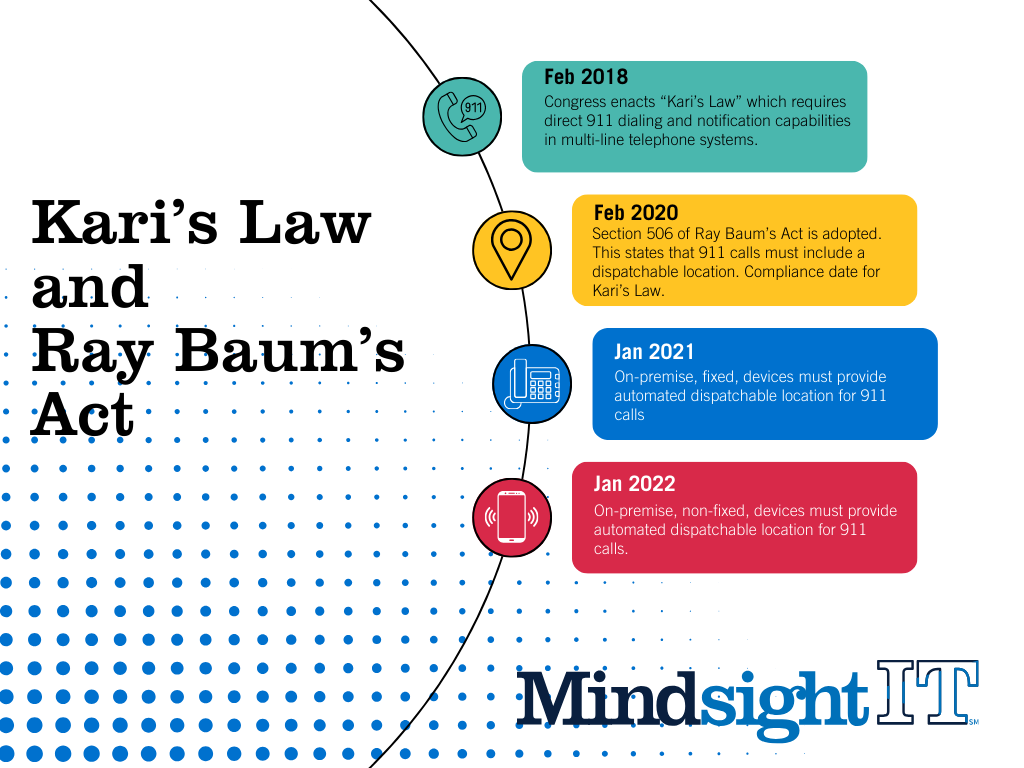September 5, 2024
It’s been a few years since we last wrote about two federal statutes that bolster emergency 9-1-1 calling in buildings with on-prem, cloud or hybrid multi-line telephone systems (MLTS): Kari’s Law and Section 506 of RAY BAUM’S Act. These laws, which took effect in early 2018 and early 2021, respectively, were intended to improve emergency response capabilities for millions of remote workers and various organizations.
In 2024, the enforcement landscape has evolved. The FCC continues to ramp up its compliance efforts, with increased audits and investigations into MLTS operators. In recent months, several high-profile cases have demonstrated the Commission’s commitment to rigorous enforcement. For instance, in July 2024, the FCC announced a $100,000 fine against a major company for failing to update its emergency call systems, highlighting the increasing financial risks of non-compliance.
If your business isn’t compliant yet, it’s wise to start the process now. Non-compliance could lead to fines amounting to $3,500 per week, totaling $182,000 annually. The cost of compliance is a fraction of these potential penalties.
Despite these penalties, compliance rates remain a concern. According to a July 2024 report from Campus Safety Magazine, compliance rates remain troublingly low. “Experts estimate that less than 20 percent of organizations, including educational institutions, are fully compliant with Kari’s Law and RAY BAUM’S Act, despite 80 percent claiming they are,” the report notes. Mark Fletcher, vice president of safety solutions at 911inform and an advocate of Kari’s Law, estimates that the actual number of compliant organizations is likely under 50 percent, reflecting ongoing challenges in meeting these regulations.
“There have been polls done across the industry. Self-reporting, 60 percent say they are compliant,” Fletcher said. “Now, that’s someone being asked, ‘Are you compliant with a law that’s federally mandated and exposing you to massive liability?’ You’re not going to get a lot of people that say they aren’t.”

Last May, in Illinois, legislation that complements Kari’s Law and RAY BAUM’S Act was signed into law. House Bill 5502, sponsored by Illinois senator Bill Cunningham, further streamlines the 9-1-1 calling process so it’s easier for callers (especially children) to dial out and reach responders in an emergency. According to an article on Cunningham’s website, “Under the new law, MLTS vendors and manufacturers must configure new systems to support direct dialing 911.” So, if you’re located in Illinois, that’s something else to consider on your journey toward compliance.
“There are obligations for everyone, from the manufacturer and distributor through to the operator of any multiline telephone system,” Martha Buyer, a telecommunications attorney, said of E911 compliance in a blog post on TechTarget.com.
“In addition to addressing the technical aspect of compliance,” the article went on to summarize Buyer’s advice, “it’s important for organizations to regularly meet with emergency responders to establish the information that would be most useful to them. Location information that might make sense to an HR or IT team, such as cubicle designations, may not be as helpful for emergency responders.”
And this: “Organizations also need to be aware of how new technology could affect compliance with Kari’s Law and RAY BAUM’s Act. For example, one trend Burch said he was starting to see was enterprises deploying their own private wireless networks to replace a Wi-Fi network. In that scenario, the enterprise is providing the network, which could mean compliance requirements for 911 location information.”
It’s crucial to understand your MLTS. If you’re not sure how or if Kari’s Law or RAY BAUM’s Act or the recently enacted Illinois law impact your organization, your friendly neighborhood MSP (perhaps Mindsight) can offer valuable insight that could save you from paying penalties and will make your systems as effective as possible.
Emergencies arise all the time, as evidenced by the nearly quarter-billion 9-1-1 calls placed in the U.S. each year. Making your E911 systems fully compliant, if they aren’t already, may well save lives.
About Mindsight
Mindsight is industry recognized for delivering secure IT solutions and thought leadership that address your infrastructure, cybersecurity, and communications needs. Our engineers are expert level only – and they’re known as the most respected and valued engineering team based in Chicago, serving medium-sized to enterprise organizations around the globe. That’s why clients trust Mindsight as an extension of their IT team.
Visit us at http://www.gomindsight.com